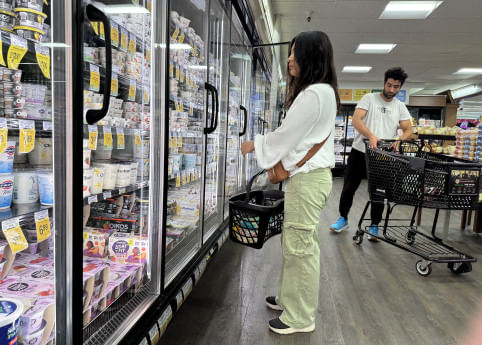US Fed's preferred inflation measure edges down in August

An inflation metric closely watched by the US Federal Reserve crept lower Friday, according to government data, supporting the central bank's decision earlier this month to begin cutting interest rates -- ahead of November's presidential election.
The central bank operates independently of the US administration, but rate cuts lower borrowing costs over time and could bring consumers some relief at a point when the economy is among voters' biggest concerns.
The personal consumption expenditures (PCE) price index was up 2.2 percent from a year ago in August, down from 2.5 percent in July, the Commerce Department said.
Between July and August, the PCE price index was up 0.1 percent -- a lower reading than July's 0.2 percent -- according to Friday's report.
Inflation is now "similar to pre-pandemic levels," President Joe Biden said in a statement.
"The economy, incomes, savings and consumer spending are all stronger than previously estimated," he added, while conceding that more work needs to be done to lower costs.
To ease demand and counter inflation, the Fed rapidly hiked the benchmark lending rate starting in 2022 and had been holding rates at a high level since.
But with price increases cooling and heading toward the central bank's longer-term target of two percent, policymakers announced last week that they were slashing rates by 0.5 percentage point.
Friday's reading likely reinforces perceptions that it was the right time for the Fed to begin lowering rates, as it seeks to lower inflation without tipping the world's biggest economy into a downturn.
Excluding the volatile food and energy segments, the core PCE price index came in at 2.7 percent from a year ago in August, higher than July's 2.6 percent figure, the Commerce Department said.
But the core reading slowed from 0.2 percent to 0.1 percent between July and August.
"Overall, the data show slowing -- but positive -- spending and a deceleration in inflation," said economists Carl Weinberg and Rubeela Farooqi of High Frequency Economics.
"We think the data show enough progress on key inflation metrics for policymakers to continue cutting rates," the economists added.
In particular, real consumer spending rose 0.1 percent in August, underscoring that "consumers are becoming more frugal in their spending and that the momentum in spending is slowing," said Nationwide chief economist Kathy Bostjancic.
She added that data on the labor market will be key in determining the pace of interest rate shifts moving forward.



 For all latest news, follow The Daily Star's Google News channel.
For all latest news, follow The Daily Star's Google News channel.
Comments